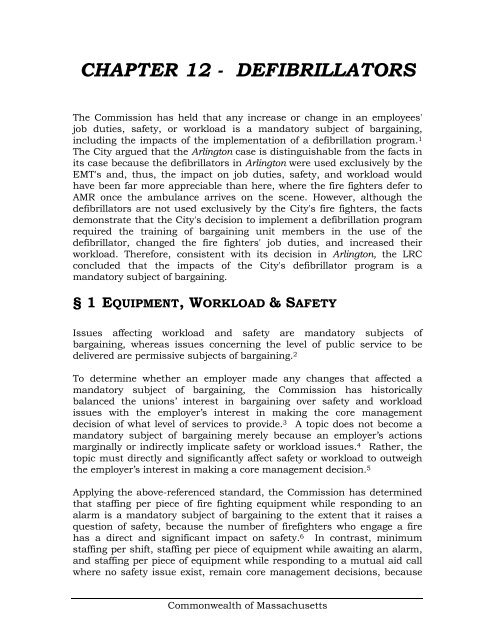Management Rights - AELE's Home Page
Management Rights - AELE's Home Page
Management Rights - AELE's Home Page
Create successful ePaper yourself
Turn your PDF publications into a flip-book with our unique Google optimized e-Paper software.
CHAPTER 12 - DEFIBRILLATORS<br />
The Commission has held that any increase or change in an employees'<br />
job duties, safety, or workload is a mandatory subject of bargaining,<br />
including the impacts of the implementation of a defibrillation program. 1<br />
The City argued that the Arlington case is distinguishable from the facts in<br />
its case because the defibrillators in Arlington were used exclusively by the<br />
EMT's and, thus, the impact on job duties, safety, and workload would<br />
have been far more appreciable than here, where the fire fighters defer to<br />
AMR once the ambulance arrives on the scene. However, although the<br />
defibrillators are not used exclusively by the City's fire fighters, the facts<br />
demonstrate that the City's decision to implement a defibrillation program<br />
required the training of bargaining unit members in the use of the<br />
defibrillator, changed the fire fighters' job duties, and increased their<br />
workload. Therefore, consistent with its decision in Arlington, the LRC<br />
concluded that the impacts of the City's defibrillator program is a<br />
mandatory subject of bargaining.<br />
§ 1 EQUIPMENT, WORKLOAD & SAFETY<br />
Issues affecting workload and safety are mandatory subjects of<br />
bargaining, whereas issues concerning the level of public service to be<br />
delivered are permissive subjects of bargaining. 2<br />
To determine whether an employer made any changes that affected a<br />
mandatory subject of bargaining, the Commission has historically<br />
balanced the unions’ interest in bargaining over safety and workload<br />
issues with the employer’s interest in making the core management<br />
decision of what level of services to provide. 3 A topic does not become a<br />
mandatory subject of bargaining merely because an employer’s actions<br />
marginally or indirectly implicate safety or workload issues. 4 Rather, the<br />
topic must directly and significantly affect safety or workload to outweigh<br />
the employer’s interest in making a core management decision. 5<br />
Applying the above-referenced standard, the Commission has determined<br />
that staffing per piece of fire fighting equipment while responding to an<br />
alarm is a mandatory subject of bargaining to the extent that it raises a<br />
question of safety, because the number of firefighters who engage a fire<br />
has a direct and significant impact on safety. 6 In contrast, minimum<br />
staffing per shift, staffing per piece of equipment while awaiting an alarm,<br />
and staffing per piece of equipment while responding to a mutual aid call<br />
where no safety issue exist, remain core management decisions, because<br />
Commonwealth of Massachusetts
















